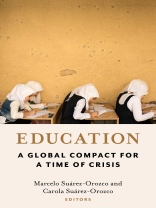In an age of catastrophes—unchecked climate change, extreme poverty, forced migrations, war, and terror, all compounded by the COVID-19 pandemic—how can schooling be reengineered and education reimagined? This book calls for a new global approach to education that responds to these overlapping crises in order to enrich and enhance the lives of children everywhere.
Marcelo Suárez-Orozco and Carola Suárez-Orozco convene scholars and practitioners from a range of disciplines—including anthropology, neuroscience, demography, psychology, child development, sociology, and economics—who offer incisive essays on the global state of education. Contributors consider how educational policy and practice can foster social inclusion and improve outcomes for all children. They emphasize the centrality of education to social and environmental justice, as well as the philosophical foundations of education and its centrality to human flourishing, personal dignity, and sustainable development. Chapters examine topics such as the neuroscience of education; the uses of technology to engage children who are not reached by traditional schooling; education for climate change; the education of immigrants, refugees, and the forcibly displaced; and how to address and mitigate the effects of inequality and xenophobia in the classroom. Global and interdisciplinary, Education speaks directly to urgent contemporary challenges.
Contributors include Stefania Giannini, the director of education for UNESCO; development economist Jeffrey Sachs; cognitive psychologist Howard Gardner; Carla Rinaldi, president of the Reggio Children Foundation; and academics from leading global universities. The book features a foreword by Pope Francis.
สารบัญ
Foreword. Education: The Global Compact, by the Holy Father Pope Francis
Acknowledgments
Introduction: The Global Compact on Education, by Marcelo Suárez-Orozco
Part I. Addressing Our Most Vulnerable
1. Education and Inequality, by Jeffrey D. Sachs
2. Education, Health, and Demography, by David E. Bloom and Maddalena Ferranna,
3. Child Poverty and Cognition: Developmental and Educational Implications, by Sebastián Lipina
4. Education for Refugee and Displaced Children, by Hirokazu Yoshikawa, Sarah Dryden-Peterson, Dana Burde and J. Lawrence Aber
5. The Consequences of Emergency and Humanitarian Relief Education for Syrian Refugee Children in Turkey and Lebanon, by Maha Shuayb, Maurice Crul and Frans Lelie
6. Countering Cascading Xenophobia: Educational Settings at the Frontline, by Carola Suárez-Orozco
Part II. Ethical and Civic Considerations
7. Education as a Moral Responsibility, by Stefano Zamagni
8. On Educating the Three Virtues: A Hegelian Approach, by Howard Gardner
9. Ethics in Education and Education of Ethics, by Vittorio Hosle
10. Education for a Purposeful Life, by William Damon and Anne Colby
11. Educating for Democracy in Contentious Times, by John Rogers
Part III. Educating for a Sustainable Future
12. Climate Change Education for All: Bending the Curve Education Project, by Veerabhadran Ramanathan, Fonna Forman, Marcelo M. Suárez-Orozco, Alan Roper, Scott Friese, Karen Flammer, , Hahrie Han, Adam Millard-Ball, Paula Ezcurra, and Astrid Hsu
13. Education for Sustainable Development, by Radhika Iyengar, Haein Shin, and Tara Stafford Ocansey
Part IV. The Foundations of Education
14. Early Childhood Education in Reggio Emilia and the World, by Carla Rinaldi
15. Addressing our Global Developmental Emergency: Early Intervention and the Think Equal Early Years Program, by Leslee Udwin
16. The Future of Literacy in a Digital Culture: Promise and Perils, by Maryanne Wolf
17. The Feeling of Reading in a Changing World: From Neurons to Narratives, by Tami Katzir
Part V. The Futures of Education
18. Global Learning Ecologies: Leveraging Technologies for Equity, by Brigid Barron
19. Improvement Science: The Social Glue that Helps Helpers Help?, by Louis M. Gomez, Manuelito Biag, and David G. Imig
20. UNESCO and the Futures of Education, by Stefania Giannini
Afterword: Universal Education: An Essential Pillar for All Sustainable Development Goals, by Jennifer Gross, Peter Stengaard, and Vanessa Fajans-Turner
List of Contributors
Index
เกี่ยวกับผู้แต่ง
Marcelo Suárez-Orozco is chancellor of the University of Massachusetts Boston. He previously served as the inaugural Wasserman Dean of the School of Education and Information Studies at the University of California, Los Angeles. He is the author or editor of numerous books and articles on cultural psychology and psychological anthropology, with an emphasis on education, globalization, and migration.Carola Suárez-Orozco is professor in residence at the Harvard Graduate School of Education and director of the Immigration Initiative at Harvard. Her most recent book is Immigrant-Origin Students in Community College: Navigating Risk and Reward in Higher Education, coedited with Olivia Osei-Twumasi (2019).The Suárez-Orozcos are the cofounders of Re-imagining Migration. Their previous coauthored books include Learning a New Land: Immigrant Students in American Society, with Irina Todorova (2008).












